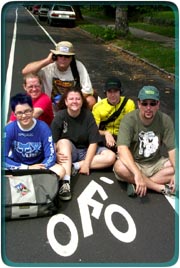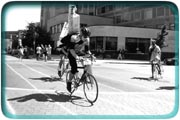August 31September 7, 2000
naked city
Pedal Pushers
 |
|
|
Share the road: The CMWC2000 coordinators (l to r, top row) Derek Chadbourne and BMac Anchorage AK, (l to r, bottom row) Alison Cross, Wendy Fallin, Michael Dailey, John Kenda. photo: Jason Fritzsche |
|
Most of us hate our jobs. Everyday we trudge to work, exchange pleasantries with co-workers in the elevator and then dive into our offices or cubicles to stare at computer screens or shuffle papers. For a rare few, the daily grind is something more. For one group in particular, a day on the job is so exciting they made it into a sport. Enter the 8th annual Cycle Messenger World Championships.
This weekend Philly joins cities such as Berlin, San Francisco, Toronto and Washington, D.C. in hosting the event which draws more than 500 bicycle couriers from around the globe. Four days of competition will be held in Fairmount Park to determine the best of the best. But its not about prize money or celebrity endorsements. The winner gets massive bragging rights. And there are plenty of locals who plan on taking their shot at the glory.
“The Europeans are tough, but weve got some good riders here,” says TimeCycle founder Jeff Appeltans, whos pulling for his crew of couriers.
While events have been going on all week, things dont really get started until Saturday, Sept. 2. Thats when racers compete in the first of two days of qualifying time trials. Those who make the cut will square off in Mondays main event, when 100 cyclists, 80 men and 20 women, will vie for the title of Cycle Messenger World Champion in a course custom designed to test parcel delivery skills. At the sound of the gun, riders rush to a checkpoint and grab a delivery agenda. Just like a day on the job, they have to get from point A to point B as quickly as possible. And just like Center City, the Fairmount Park racecourse is a maze of one way streets. While there may not be any buses to avoid, going against the flow of traffic in a swarm of competitors is dangerous. If a messenger needs to turn around, they must pull over and get off their bike. Failing to do so, or to comply with other safety precautions (such as wearing a helmet), is grounds for disqualification.
While most people try to put work out of their mind on their days off, every effort is made to replicate the work environment for the racers. Obstacles may be placed in the course to simulate pedestrians. Riders carry cumbersome odd-shaped packages. To further add to the realism, the manifests include two types of deliveries, easy jobs and challenging ones. The difficult jobs pay more (no, they dont use real money), but also take more time. Couriers choose which jobs to take and what order to make their deliveries in. Four hours after it starts, the rider who has earned the most cash wins.
Besides the main race, couriers compete in an odd array of smaller events (visit www.dccourier.com for a full schedule). There are team races, sprint trials and a cargo race where messengers transport insane loads empty beer kegs, traffic pylons, metal folding chairs on modified bikes. Another favorite is the Trials event, where contenders launch off ramps, hop onto platforms and bounce off of automobiles. Theres enough action here for three Mountain Dew commercials. A high jump event called the Bunny Hop pits BMX-ers against each other as they see who can get the furthest from the ground. The world record is 104 centimeters (just over three feet).
Two events cater exclusively to track bike enthusiasts. The Track Skid event involves gaining speed and then sliding as far as you can after locking up your back tire. Because track bikes have no brakes and just one fixed gear, riders must use leg strength and coordination to stop their rear wheel. In the Track Stand (also known as the Circle of Death), riders form a loose circle and stand still without touching the ground. Its sort of like that log-balancing thing they did on Survivor. After a few minutes cyclists must remove one hand from their handlebars, then two. Next its time to balance with one foot off the bike. Finally the remaining diehards sit with no hands and no feet on their bikes.
 |
|
|
Carry on: At the 1998 CMWC in Washington, DC, package-ridden cyclists race to their next drop-off point. photo: Jeff Wiesner |
|
“When I travel, I now know people in lots of different cities,” enthuses former messenger Jeff Wiesner.
Wiesner is one of many locals whos been lending a hand to the CMWC. Wiesners Abacus Studios has been doing graphics for the race. Comet Café, Space 1026, 4040 and other local businesses have donated their spaces for events. According to CMWC2000 organizer John Kenda, “Philadelphia has been enormously welcoming. Between the Fairmount Park Commission, the police department and the local volunteers I cant run out of good things to say about this city. Im a broken record.” Kenda is so impressed with Philly, he says he may move here permanently.
Until last fall, Kenda and the CMWC2000 called Boston home. Kenda and his fellow Bostonians beat out a contingent from Budapest at last years world championships in Zurich and won the right to host the 2000 championships. Beantowns messenger community was in the process of coordinating the event when a freak accident sent the city into an anti-messenger frenzy. According to Kenda, a local politician was crossing against a red light when a messenger hit him. When it came time to get permits for the CMWC, the city became very uncooperative. Luckily Phillys bike couriers welcomed their Boston brethren with open arms. And the city seems more than ready to turn Bostons loss into our gain. Not only does our local economy benefit from all those bike messenger dollars, residents will also have the opportunity to witness some world class competition and, who knows, maybe this year a local will win.
